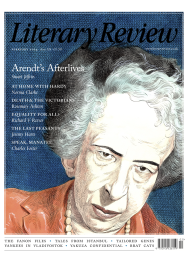Francesca Peacock
Shuffling the Days
Alphabetical Diaries
By Sheila Heti
Fitzcarraldo Editions 163pp £10.99
Over the space of ten years, Sheila Heti, the Canadian author of How Should a Person Be? (2010) and Motherhood (2018), kept a diary. She recorded the minute details of everyday life (‘Am low on money. Am making noodles. Am reading Emma’) and chronicled her anxieties as a novelist and writer: ‘the book you see in your head is the book it will be, and there is no better book than the book in your head.’
Chronological order is the only kind of order one expects in a diary, where each entry has to be written after the one that preceded it. But Heti’s published diaries upend this expectation. She arranged each sentence of her 500,000-word diary in alphabetical order and edited the result down to 60,000 words. Running from A (‘A book’) to Z (‘Zadie Smith’s husband’), Alphabetical Diaries is like an Excel spreadsheet filled with the detritus of a life. Part of this experiment with structure first appeared in the New York Times. Now Fitzcarraldo Editions has published the entire work.
What emerges when a life is alphabetised and when normal ordering principles – chronology, ageing – are removed? It’s amazing how easy it is to pick up themes: Heti’s decade-long relationship with Lars (‘hanging on his indifferent and careless emails’); a different relationship with Pavel; relationships with Vig, Gil and ‘the anti-neo-Nazi girl’. Discernible threads appear too: from longing for an email to not noticing its arrival, from being happy to feeling irritated ‘on a very deep level’. The only difference is a refusal to think in terms of growth, or, as Heti puts it, ‘post-capitalist’ development. A decade’s worth of life is presented almost flatly, with little comment or judgement. In the preface to the version which appeared in the New York Times, Heti stated that the project of keeping a diary initially stemmed from a desire to see if she had ‘changed’ over a decade, and what ‘patterns and repetitions’ could be identified. Reading this alphabetised version, it is possible to notice change only on a small scale, sentence by sentence.
For all its earnestness and experimentation, Alphabetical Diaries is funny. A sentence proclaiming, ‘A husband is a good insurance against the crazy, against the many things of the world,’ is followed by one that reads, ‘A Jane Austen novel, of course, or inspired by that’. Elsewhere, Heti asks, ‘Why do women go mad? Why does one bra clasp in the front and the other in the back?’ These lines get a laugh, but they also raise a question. The humour seems too neat to be accidental. They prove what most readers will suspect from the beauty of Heti’s prose: Alphabetical Diaries is, in part, a work of fiction.
The idea that a published literary diary is an honest record of what happened is not a given. And why should we, the readers, feel entitled to access her unedited diaries anyway? Alphabetical Diaries poses its own answers to these questions. It’s a literary work so stylish and philosophically inquisitive that it’s impossible not to take it on its own terms. This is a delightful play with authenticity. In Heti’s words, it is ‘fiction and non-fiction together, because the imagination is more amazing than anything in life, and life is more amazing than anything you can make up’.

Sign Up to our newsletter
Receive free articles, highlights from the archive, news, details of prizes, and much more.@Lit_Review
Follow Literary Review on Twitter
Twitter Feed
Literary Review is seeking an editorial intern.
Though Jean-Michel Basquiat was a sensation in his lifetime, it was thirty years after his death that one of his pieces fetched a record price of $110.5 million.
Stephen Smith explores the artist's starry afterlife.
Stephen Smith - Paint Fast, Die Young
Stephen Smith: Paint Fast, Die Young - Jean-Michel Basquiat: The Making of an Icon by Doug Woodham
literaryreview.co.uk
15th-century news transmission was a slow business, reliant on horses and ships. As the centuries passed, though, mass newspapers and faster transport sped things up.
John Adamson examines how this evolution changed Europe.
John Adamson - Hold the Front Page
John Adamson: Hold the Front Page - The Great Exchange: Making the News in Early Modern Europe by Joad Raymond Wren
literaryreview.co.uk